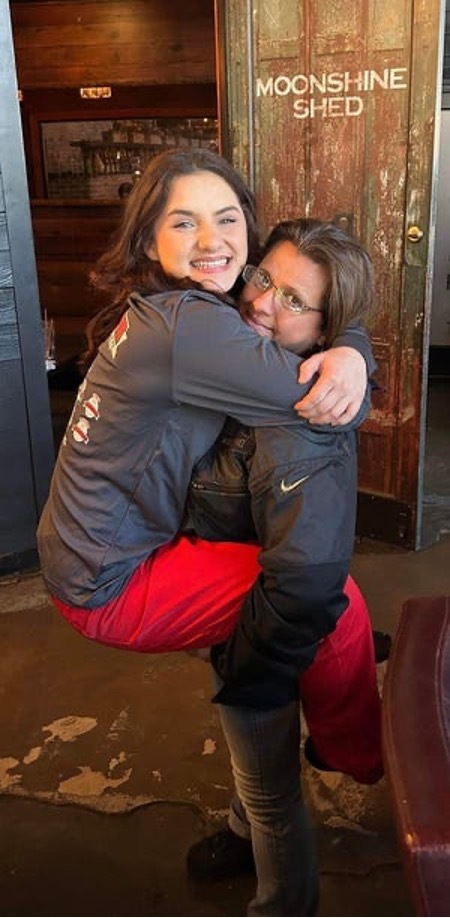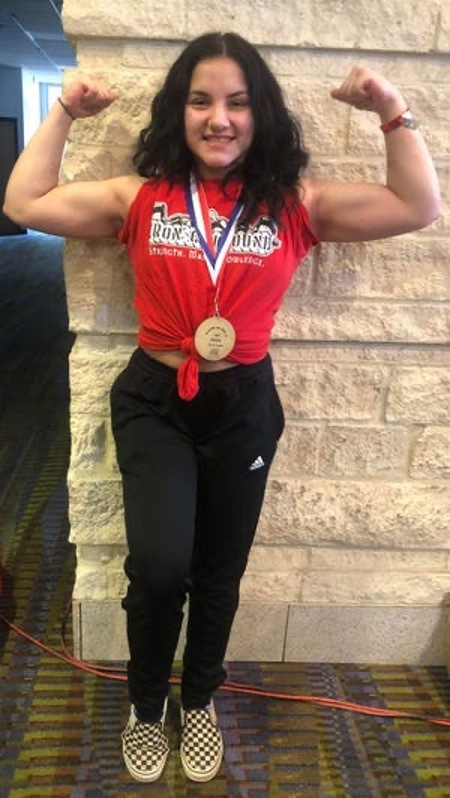Teen powerlifter wins gold at state competition after injury

Most people would call winning a state powerlifting competition after a potentially career-ending injury a comeback story; Jozannah Rodriguez calls it being too stubborn to quit.
Rodriguez, a high school senior from Corpus Christi, Texas, found her passion in powerlifting as a freshman and wasted no time in making her mark on the sport. In her junior year, she took home gold at her first invitationals, regionals and then, finally, the state competition. It seemed as though nothing could hold her back from her record-breaking quest for success — until, unexpectedly and all at once, something did.
To Rodriguez, the injury didn’t seem like anything to worry about at first. It took place during an off-season cheerleading practice, when a descending flier’s foot struck Rodriguez’s wrist at just the wrong angle during a catch. The resulting ache seemed normal enough and, after an all-clear X-ray, she and her coaches wrote it off as a run-of-the-mill injury. But the pain persisted, following the athlete around at practice, school and her part-time waitressing job, and she began to wonder if something else might be wrong.
Rodriguez returned to her primary physician, who then referred her for a consultation with Eric Wait, a Pediatric Orthopedic Surgeon at Driscoll Children’s Hospital. An MRI revealed that Rodriguez had a small tear within the tendons of her wrist that had been exacerbated by repetitive motion and strain. Fortunately, the tear didn’t pose a functional problem; however, the pain prevented her from performing to her usual standard.
“Whenever you're doing some sort of repetitive movement, if you have tendon gliding issues, it makes the problem a lot worse,” Wait explained during an interview. “Jozannah probably would have been able to continue competing, but the pain would have prevented her from lifting the amount that she used to, let alone performing to her maximum potential.”
Fighting for a chance to compete
Initially, Rodriguez and Wait initially agreed that trying a non-operative approach — in this case, wearing a brace for a month before receiving a steroid shot — was the best option, given that it was the least-invasive approach and wouldn’t put the athlete at as much risk. However, when Rodriguez learned during a follow-up appointment that she would need to wait two more months to recover before receiving the steroid shot, she found herself reconsidering a decision that could, in a very literal sense, change the course of her life forever.

“When they told me I would have to wait three months instead of one, that was it, I was like, ‘I don’t have three months,’” Rodriguez stated. “The season was coming up and I neededto be ready to compete.”
That determination drove Rodriguez to reach back out to Dr. Wait and make her case: she needed to perform at her best during the upcoming invitationals, even if she had to undergo surgery to make it happen.
“She saw the timeline better than I did; she knew that her performance wasn’t correcting fast enough,” Dr. Wait said. “As a doctor, I always try to take my patient’s life stories and what they want to do into consideration. In Jozannah’s case, she was a powerlifter and she needed to lift by a specific date. We took that into account and actually expedited the process for her so she could be successful.”
But despite successfully advocating for surgery, Rodriguez found herself oscillating between hope and anxiety in the weeks leading up to her procedure. She wondered whether she’d accelerate her career or be forced to end it entirely. When the athlete awoke post-op to hear that the procedure had concluded successfully, she remembers breaking down in tears.
“If they had told me, ‘You’re no longer a lifter, you need to stop for your medical health,’ I would have stopped. It would have crushed me, but I would’ve done it,” she said. “I honestly lost hope for a bit and thought about becoming a team manager, because I love teaching my sport. But when I woke up and heard there was a chance to go back and aim for state champ, I was all in.”

The long road to recovery — and a comeback victory
Of course, no postoperative recovery is easy — and for Rodriguez, an athletic go-getter by nature, healing proved to be a uniquely frustrating experience. For several weeks, she had to ask for help with everyday tasks, give up her waitressing job and drastically scale back her typical workout routine. More than the inconvenience, though, Rodriguez found herself unsettled by the change in her body.
“When I weighed in after my surgery, I had lost about 50 pounds of muscle. I went from eating huge portions because I was always working out to barely finishing half of what I used to eat. Ever since I was a freshman, powerlifting has been my personality — it’s who I am. It was really weird to see myself wither away; I was just like, this isn’t me,” she reflected.
That discomfort fueled her to prove herself as an athlete once she could safely return to the gym. Under the careful guidance of her coach and Dr. Wait, Rodriguez ramped up her rehabilitation and returned to training with the intent of outperforming her peers — and her own past accomplishments — during her senior powerlifting season. Looking back, she says that she felt a need to show her surgeons that their work wasn’t in vain, and that she had made the most of the opportunity they gave her.
And as the season progressed, Rodriguez found another motivation to outshine her competition: scholarship opportunities.
“At first, I was planning to go to Texas State. But then I heard that there were scholarships where schools would sign you for a full ride,” she said. “I found five, called them all up, and the one I wanted to go to the most told me that they’d have scouts at States. That’s when I told my coach, ‘This is the meet that determines whether I get a full ride or not; we’re in this to win it.’”
And the rest, as they say, is history. Rodriguez set a state record in her opening lift — which was beaten by a competitor in the next round — then went on to battle that same competitor in a two-woman race to the top. When the scores were totaled, the results came in: Rodriguez was, once again, a state champion. It was an underdog story with a comeback conclusion; a redemption story played out to the best possible ending.
Jozannah’s performance earned her a full ride scholarship to Midland University in Fremont, Nebraska where she will be studying Exercise Science with a coaching certification, including plans for a master’s degree in Athletic Training. “I’m just so grateful to Dr. Wait and Driscoll Children’s Hospital, because none of this would have been possible; they gave me a chance to prove that I could do this,” Rodriguez said. “It’s like people say, God gives his toughest battles to his strongest soldiers; even if you’re mad about the circumstances, you pull through. I just wouldn’t let anyone tell me no.”
